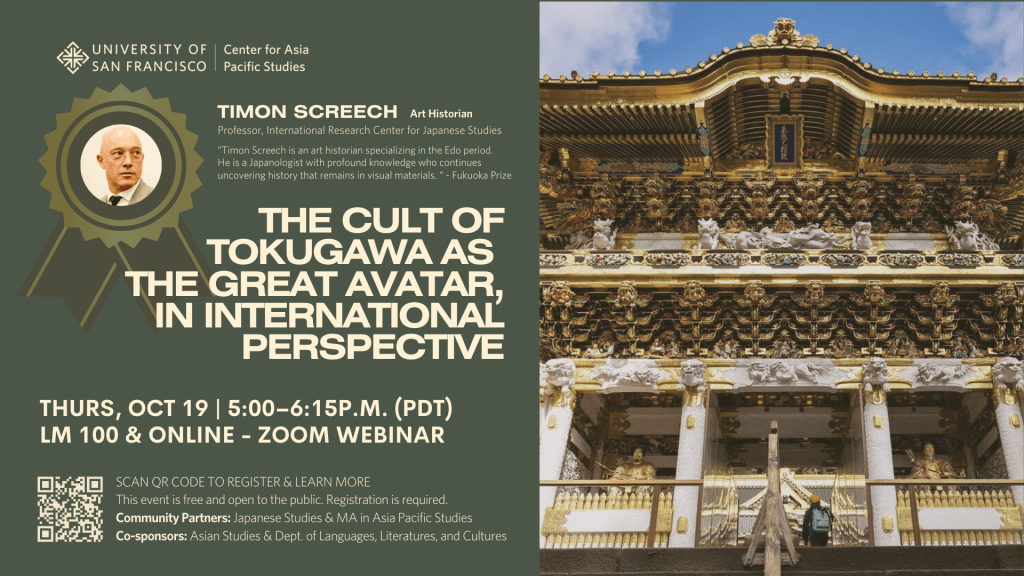
Since 1988, the Center for Asia Pacific Studies has gained a reputation for conceptualizing and hosting events that promote greater understanding of the peoples and cultures of the Asia Pacific region. Fostering and promoting innovative research and teaching designed to create conversation and dialogue, our programs attract diverse audiences, consisting of faculty, staff, students and members of the public from the San Francisco Bay Area and throughout the world. As the semester comes to an end, the Center is excited to share recordings and highlights of our past lectures.
Coastal Whales and Mountain Whales: Writing a Marine Environmental History for Tokugawa Japan
Lecture by Jakobina Arch, Whitman College
The USF Center for Asia Pacific Studies welcomed Jakobina Arch to speak about her recent book, Bringing Whales Ashore: Oceans and the Environment of Early Modern Japan. Arch shared what we can learn about the interrelationships between marine space and its inhabitants, like whales passing through coastal waters, and the terrestrial spaces of the Japanese archipelago that whale products and ideas about whales traveled into. During the Tokugawa period, specialized whaling groups developed, hunting the whales which migrated along Japan’s southern and western coasts. How did people actually get whales ashore and how far did they go? Tracing the movement of whales, living and dead, shows how important the ocean has been in areas of Japan far from whaling itself, even in a period most well known for being mostly closed to overseas trade.
Why do Chinese Women Seek Western Men: The Case of China’s Email-Order Brides
Lecture by Monica Liu, University of St. Thomas Minnesota
The USF Center for Asia Pacific Studies welcomed Monica Liu (University of St. Thomas Minnesota) to share her latest research on why Chinese women seek Western men. China has undergone a striking transformation over the past four decades, growing from a poor country to the world’s second-largest economy. Despite its ascendance on the world stage, a significant number of women are still desperately seeking to marry Western men and immigrate abroad. To pursue their elusive dream, these women are turning to global internet dating agencies. From 2008 to 2019, Liu conducted research at three different transnational dating agencies in China, interviewing 61 Chinese female clients, the majority of whom were middle-aged and divorced. In this talk, she will address how emerging inequalities brought on by China’s transition from state socialism toward a global market economy shaped these women’s desires to leave their country. Ultimately, their desires to pursue marriage migration not only reveal their longing for a better life but also cast a revealing light on the pervasive gender, age, and class inequalities that continue to plague modern-day China.
Abortion and Reproductive Politics in Modern China
Lecture by Sarah Mellors Rodriguez, Missouri State University
The USF Center for Asia Pacific Studies welcomed Professor Sarah Mellors Rodriguez (Missouri State University) to discuss research from her new book, Reproductive Realities in Modern China. At an annual rate of 49 abortions per 1,000 reproductive-aged women, China has one of the highest abortion rates in the world. This phenomenon is often attributed to the One Child Policy (1979-2015), yet even when abortion was illegal in the early twentieth century, it was already commonplace. This talk traced the history of contraception and abortion in China from the fall of the Qing dynasty in 1911 to the present. Rodriguez demonstrated how inconsistent state policies and patriarchal norms have historically worked in concert to normalize abortion as birth control.

The Cult of Tokugawa as the Great Avatar, an International Perspective
Lecture by Timon Screech, International Research Center for Japanese Studies (Nichibunken), Kyoto
This event was not recorded.
The USF Center for Asia Pacific Studies welcomed professor Timon Screech to share his latest research on the Cult of Tokugawa as the Great Avatar from an international perspective. Tokugawa Ieyasu died in 1616 and was deified as a shinto kami. The following year he was exhumed, translated, and reburied under different and conflicting rites, which turned him into a Buddhist avatar. This lecture investigated the reasons for that change, and the resulting cult of Ieyasu at the ancient holy site of Nikkō. Of special interest are a series of lanterns donated to the complex by the Dutch East India Company.
